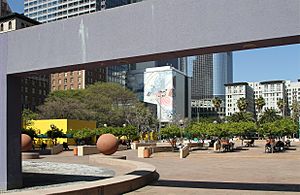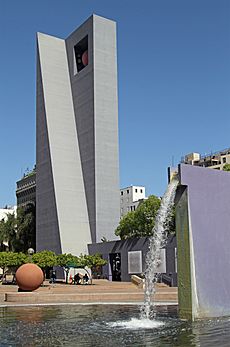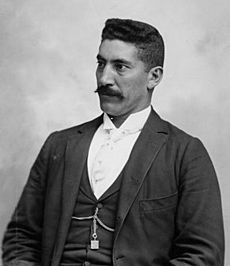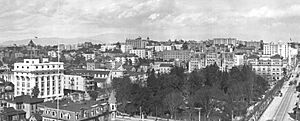Pershing Square (Los Angeles) facts for kids
Quick facts for kids Pershing Square |
|
|---|---|
| La Plaza Abaja | |

Pershing Square, 2012
|
|
| Location | Downtown Los Angeles, California |
| Area | 5-acre (20,000 m2) |
| Created | 1866 |
| Operated by | City of Los Angeles |
| Status | open |
| Public transit access | |
Pershing Square is a cool public park right in the middle of Downtown Los Angeles, California. It's about one city block big, surrounded by 5th Street, 6th Street, Hill Street, and Olive Street. This park has a long history! It was first opened in 1866 by Mayor Cristóbal Aguilar and called La Plaza Abaja. Over the years, it had many different names. Finally, in 1918, it was named Pershing Square to honor General John J. Pershing.
Contents
Discovering Pershing Square's Past
How the Park Began
Back in the 1850s, this area was a camping spot for people visiting the old Pueblo de Los Angeles. Surveyors marked it as 10 plots, but it was really one big 5-acre space. A small stream, Arroyo de Los Reyes, even flowed through it.
In 1866, Mayor Cristóbal Aguilar officially made it a public park. He named it La Plaza Abaja, which means "the lower plaza" in Spanish. A German immigrant named George "Roundhouse" Lehman, who owned a nearby place, planted trees and flowers. He took care of the park until he passed away in 1882.
Changing Names and New Features
The park got many new names over the years. In 1867, it was called St. Vincent's Park because a college was across the street. Then, in 1870, it became Los Angeles Park. By 1886, it was 6th Street Park and got a new design.
In the early 1890s, it was renamed Central Park. During this time, a special stage for concerts and speakers was added. The park became a beautiful, shady spot with lots of plants. It was even used for the yearly crowning of the queen for 'La Fiesta de Los Angeles' in 1894.
Early 1900s: Monuments and Renovations
In 1900, a monument was put up to remember Californians who died in the Spanish–American War. This is thought to be the oldest piece of public art in Los Angeles! The city declared it a historic monument in 1990.
The park got a big makeover in 1910, designed by John Parkinson. He also designed famous buildings like Los Angeles City Hall. His design included a beautiful three-tier fountain with cherubs. In November 1918, after World War I ended, the park was renamed Pershing Square to honor General John J. Pershing.
More tropical plants were added in the 1920s and 1930s, making the park even lusher. In 1924, a bronze statue of a World War I soldier, called a "doughboy," was unveiled. A bronze cannon from the famous USS Constitution ship was added in 1935. In 1932, a statue of the famous composer Ludwig van Beethoven was placed in the park.
Mid-Century Changes and Challenges
During World War II, Pershing Square was a busy place for rallies and recruitment. After the war, as people moved to the suburbs, the park became less popular.
In 1952, the entire park was dug up to build a three-level underground parking garage. A thin layer of soil and grass was placed on top of the garage. In 1954, Kelly Roth, a local businessman, donated money for two reflecting pool fountains to honor his wife and the city.
The park faced challenges in the following decades. By the 1984 Summer Olympics, it needed a lot of help. The city spent $1 million on a temporary fix.
Modern Redesign and Future Plans

In 1992, the park closed for a huge $14.5-million redesign. Mexican architect Ricardo Legorreta and U.S. landscape architect Laurie Olin led the project. The new park opened in 1994. It featured a tall purple bell tower, new fountains, and a walkway that looked like an earthquake fault line. There was also a concert stage and plenty of seating.
In 2000, a monument was added to honor local veteran Eugene A. Obregon. Today, Pershing Square hosts fun seasonal events. You can find a temporary Ice rink in the winter and live concerts and festivals like DTLA Proud Festival in the summer.
Exciting changes are happening now! In 2023, a three-phase renovation project began. It's planned to be finished by the 2028 Summer Olympics in Los Angeles. This project will add new glass elevators to the parking garage and improve the park's look. Future phases will make it easier to access the plaza, remove old walls, and add more shade trees. The total cost is estimated at $110 million.
Public Art in the Park
Pershing Square is home to many interesting art pieces, both permanent and temporary. The oldest is the Spanish American War Memorial from 1900.
- Spanish–American War Memorial (1900)
- The Doughboy (1924)
- Statue of Ludwig van Beethoven (1932)
- Neons for Pershing Square (1993) (This art is actually in the transit station below the park!)
- Liquid Shard (a temporary art display from August 2016)
Getting There: Transit
You can easily get to Pershing Square using public transportation. The Pershing Square station is served by the Metro B and D lines.
See also
 In Spanish: Pershing Square (Los Ángeles) para niños
In Spanish: Pershing Square (Los Ángeles) para niños
- List of parks in Los Angeles
- Liquid Shard, a cool art installation that was in Pershing Square
- DTLA Proud Festival
 | Audre Lorde |
 | John Berry Meachum |
 | Ferdinand Lee Barnett |



